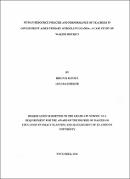| dc.description.abstract | The study examined the influence of human resource policies on teachers' performance in
government aided primary schools in Wakiso district. It was guided by three objectives; to
establish the influence of staff development policy on teachers ' performance, to find out the
influence of recognition of achievement policy on teacher performance, to establish the influence
of monetary rewards policy on teacher performance in government aided primary schools. The
study used a case study design with both qualitative and quantitative approaches. Data were
collected from four district education officials, twelve head teachers, sixty SMCs and seventy
three teachers. The collected data were analyzed using frequency counts, percentages, mean and
standard deviation. On the other hand, data from interviews and records were analyzed using
thematic analysis. The study findings reveal that human resource policies are central in
influencing the performance of teachers. The policies determine and influence a conducive
working environment while finally the findings show that the human resource policies elevate
teachers' morale to do their work thus inducing performance. The study concludes that career
opportunities policy is central in activating teachers ' performance in the academic achievement
of pupils in primary schools. This is entirely due to the fact that when teachers undertake career
opportunities, they attain skills and confidence in their activities which is translated into pupils'
performance, that recognition of achievement policy catalyze and propel teachers to performance
to enlist school goals. Finally the study concludes that monetary rewards make teachers release
their energies towards pupils' achievement. The monetary rewards like allowances allow
teachers to keep working when they have not yet received their salaries. Due to decentralization,
the human resource policies vary from school to school depending on the available resources to
implement the same. The study recommends that the government, MoES and schools should
create avenues for teachers to enhance their skills through career opportunities and staff
development practices. This can be enhanced through scholarships and study leave to the
teachers, that MoES and the district education office should put in place mechanisms and
schemes to recognize better performing teachers. This can be done on school open days,
awarding scholarships, gifts and promotion. Finally, the study recommends that MoES and the
school administration should institute a variety of incentive schemes to motivate teachers in
schools. This can be done though reserving a separate fund for giving monetary rewards to teachers. | en_US |

